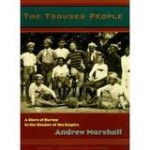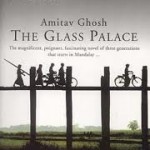A Little Deviation to Burma – Kipling’s Burma and other good reads on the country
Posted: May 19th, 2012 | 2 Comments »Right now it’s hard to find anyone I know who hasn’t in the last six months taken a trip to Burma. It’s all the rage – economic analysts, political think tankers, investment bankers, NGO-types and, of course, the hack pack looking for new stories (and inevitably of course seeking them in the same places!!). I’m stuck working and promoting books so can’t join the exodus and I suppose by the time I get round to it I’ll be able to visit a Rangoon Starbucks and get a Papa John’s pizza in Mandalay!!
Still, we can read. And I’m going to assume that everyone reading this blog has already read, and re-read, Orwell’s Burmese Days and the associated Burma essays. If you haven’t please desist from visiting this blog – it’s not really the place for you! I’d also recommend two opther great Burma books that evoke the old times (this is an old times blog afterall) – Emma Larkin’s Finding George Orwell in Burma which is fascinating and Andrew Marshall’s Trouser People: A Story of Burma in the Shadow of Empire. I’ve added details of these two below. I’d also note Amitav Ghosh’s The Glass Palace – but you should all also know that too! It would naturally be remiss of me to not plug my own small contribution to Burma studies in the form of the Carl Crow war diaries, The Long Road Back to China, I edited a couple of years ago that describe, in Crow’s own words, Rangoon, Burma and the perilous Burma Road in 1940 (I’ve blogged a lot about that before – just use the search box to find references and details).
And so I came across something that may interest us all thinking about Burma and another great writer associated with the country Kipling. Here then is a link to an address by George Webb to the royal Society of Asian Affairs given in 1983 on the subject, Kipling’s Burma: A Literary and Historical Review.
 The Trouser People – Two journeys, one hundred years apart–that of the eccentric British explorer George Scott, who introduced the game of soccer to Burmese natives, and that of the author, charting the same dangerous terrain in a country vastly changed by colonialism, war, and politics. Andrew Marshall has written an unforgettable adventure story, the wry account of two journeys into the untraveled heart of Burma. Part travelogue, part history, part reportage, The Trouser People recounts the story of George Scott, the eccentric British explorer, photographer, adventurer, and later Colonial Administrator of Burma, who introduced the Empire’s best game (soccer!) to Burmese natives and to the forbidden Wa state of headhunters, who were similarly enthusiastic about it. The second, contrasting journey is Marshall’s own, taking the same dangerous path one hundred years later in a country now devastated by colonial incompetence, war, and totalitarianism. Wonderfully observed, mordantly funny, and skillfully recounted, this is journalistic travel writing at its best.
The Trouser People – Two journeys, one hundred years apart–that of the eccentric British explorer George Scott, who introduced the game of soccer to Burmese natives, and that of the author, charting the same dangerous terrain in a country vastly changed by colonialism, war, and politics. Andrew Marshall has written an unforgettable adventure story, the wry account of two journeys into the untraveled heart of Burma. Part travelogue, part history, part reportage, The Trouser People recounts the story of George Scott, the eccentric British explorer, photographer, adventurer, and later Colonial Administrator of Burma, who introduced the Empire’s best game (soccer!) to Burmese natives and to the forbidden Wa state of headhunters, who were similarly enthusiastic about it. The second, contrasting journey is Marshall’s own, taking the same dangerous path one hundred years later in a country now devastated by colonial incompetence, war, and totalitarianism. Wonderfully observed, mordantly funny, and skillfully recounted, this is journalistic travel writing at its best.
 Finding George Orwell in Burma – In one of the most brilliant and intrepid memoirs in recent memory, Emma Larkin tells of the year she spent travelling through Burma, using as a compass the life and work of George Orwell, whom many of Burma’s underground teahouse intellectuals call simply “the prophet”. In stirring, insightful prose, she provides a powerful reckoning with one of the world’s least free countries. Finding George Orwell in Burma is a brave and revelatory reconnaissance of modern Burma, one of the world’s grimmest and most shuttered dictatorships, where the term “Orwellian” aptly describes the life endured by the country’s people. This book has come to be regarded as a classic of reportage and travel and a crucial book for anyone interested in Burma and George Orwell.
Finding George Orwell in Burma – In one of the most brilliant and intrepid memoirs in recent memory, Emma Larkin tells of the year she spent travelling through Burma, using as a compass the life and work of George Orwell, whom many of Burma’s underground teahouse intellectuals call simply “the prophet”. In stirring, insightful prose, she provides a powerful reckoning with one of the world’s least free countries. Finding George Orwell in Burma is a brave and revelatory reconnaissance of modern Burma, one of the world’s grimmest and most shuttered dictatorships, where the term “Orwellian” aptly describes the life endured by the country’s people. This book has come to be regarded as a classic of reportage and travel and a crucial book for anyone interested in Burma and George Orwell.
 The Glass Palace – Rajkumar is only a boy, helping out on a market stall in the dusty square outside the royal palace in Mandalay, when the British force the Burmese King, Queen and court into exile. He is rescued by a far seeing Chinese merchant and with him builds up a great logging business in upper Burma. But haunted by his vision of the Royal Family and one of their attendants, he journeys to the obscure town in India where they have been exiled, and his family and friends become inextricably linked with theirs. Through the lives of the wider family and connections, an extraordinary story of this century is told: in Malaya, amid the vast rubber plantations, in India, among the growing nationalist feeling, in America where ideas of democracy and terrorist action, as well as business acumen, could be learnt. By the time World War II arrives, Rajkumar – who had made and lost several fortunes – has spread his family and influence from the great estate at Morningside where his son will be involved in the British collapse in Singapore, and one of his relations in the remarkable rebellion of the Indian troops against their British officers. Another of the great characters, the formidable Indian widow, Uma, becomes a spearhead of the Indian nationalist movement and provides a final refuge for the battered remnants of the family as they flee from Burma before the Japanese advance in a horrifying trek across appalling terrain. And it his granddaughter who survives that experience who brings the readers back to contemporary Burma, and completes the circle of the family started so long ago in Mandalay.
The Glass Palace – Rajkumar is only a boy, helping out on a market stall in the dusty square outside the royal palace in Mandalay, when the British force the Burmese King, Queen and court into exile. He is rescued by a far seeing Chinese merchant and with him builds up a great logging business in upper Burma. But haunted by his vision of the Royal Family and one of their attendants, he journeys to the obscure town in India where they have been exiled, and his family and friends become inextricably linked with theirs. Through the lives of the wider family and connections, an extraordinary story of this century is told: in Malaya, amid the vast rubber plantations, in India, among the growing nationalist feeling, in America where ideas of democracy and terrorist action, as well as business acumen, could be learnt. By the time World War II arrives, Rajkumar – who had made and lost several fortunes – has spread his family and influence from the great estate at Morningside where his son will be involved in the British collapse in Singapore, and one of his relations in the remarkable rebellion of the Indian troops against their British officers. Another of the great characters, the formidable Indian widow, Uma, becomes a spearhead of the Indian nationalist movement and provides a final refuge for the battered remnants of the family as they flee from Burma before the Japanese advance in a horrifying trek across appalling terrain. And it his granddaughter who survives that experience who brings the readers back to contemporary Burma, and completes the circle of the family started so long ago in Mandalay.

But he did actually apply to join the Brigades. The story is worth tenlilg but there are still old (both aged and ex-) Communists peddling the lie that he was part of the enemy of the struggle against Fascism. According to Wikipedia, which does seem to be right on this: In April, Orwell returned to Barcelona where he applied to join the International Brigades to become involved in fighting closer to Madrid. However this was the time of Barcelona May Days and Orwell was caught up in the factional fighting. . The subsequent campaign of lies and distortion carried out by the Communist press,[38] in which the POUM was accused of collaborating with the fascists, had a dramatic effect on Orwell. Instead of joining the International Brigades as he had intended, he decided to return to the Aragon Front. Once the May fighting was over, he was approached by a Communist friend who asked if he still intended transferring to the International Brigades. Orwell expressed surprise that they should still want him, because according to the Communist press he was a fascist.[39]
a probe revealed that the biduilng in Mascot Locality where Orwell was born is registered with the parishad in the name of the hostel superintendent of Gopal Sah High School since 1970.Asthana said Rai is a teacher in Gopalsah High School and his holding no. 336 is actually that of his residence at Gandhinagar locality.Nagar parishad executive officer Rajendra Mandal said he would examine under what circumstances the holding number of the house where Orwell was born was allotted to the schoolteacher.Orwell, whose book Animal Farm’ made him stand out among the great novelists, was born in Motihari on June 25, 1903. His father R W Blair was deputy magistrate in-charge of a British-owned opium warehouse. Orwell was taken to England in 1904 by his mother Ida Mabel Blair for proper education.After 108 years of George Orwell’s birth, the Bihar government declared his birthplace as a protected site and heritage centre under the Bihar Ancient Monument (Protection) Act, 1976. Chief minister Nitish Kumar had allocated Rs 29 lakh for the construction of a fence around the protected site spread over 2.48 acres at Mascot locality. Fencing work around the decrepit tiled house in which Orwell was born has already been completed.The house located on a 2.48 acre land was leased out by the state government to Gopal Sah High School for hundred years. The lease period has already expired. Thereafter, the government took possession of the land and handed it over to PWD, Motihari, for its godown. Despite this, Rai who teaches English at Gopal Sah High School, has been occupying the house for the last 15 years.Rai said he had not been asked by anyone to vacate the house though the BDO, SDO and DM have visited this site many times. The district magistrate was not available for comment.- – – – – – – – – – – – – – – – – – – – Teacher claims house where George Orwell was bornPatna, April 2 (IANS) Legendary British author George Orwell was born in this nondescript house in Bihar’s Motihari town. The state government four months ago declared it a protected site, but a school teacher now claims to be its proud owner and has documents to back his claim.Neglected for years, the house was given on lease to a school. Brajnandan Rai taught in the school and lived in one part of the biduilng. The lease expired a few years ago, but Rai stayed on. Now he claims that the house is registered in his name.The district administration records show Rai as the owner of the place, an official told IANS over phone from Motihari.The Bihar government declared the site in December 2010 as protected and decided to renovate it. The government issued a notification under the Ancient Monument (Protection) Act, 1976. The house has been enlisted by the art and culture department for protection.Rajendra Mandal, the executive officer of the Motihari city council, said it was a matter of investigation if the teacher managed to register Orwell’s birthplace in his name.‘An inquiry would be made into how the title deed of the house was allotted to Rai,’ Mandal said.He said a probe has been ordered into how the teacher managed to register the house in his name.Orwell, famous for works like ‘the Animal Farm’ and ’1984′, was born Eric Arthur Blair in 1903 in the single-storeyed biduilng in Motihari near India’s border with Nepal.His father, Richard Blair, worked as an agent of the opium department of the Indian Civil Service during British rule.The biduilng is in ruins now, the roofline has bowed and buckled due to years of rain and a large grapefruit tree has undermined the southern wall.Only the stone floor looks solid, though it cracked during an earthquake that almost levelled Motihari in 1934.Mandal said the government has sanctioned a sum of Rs.29 lakh for the biduilng’s renovation. ‘More money is likely to be sanctioned,’ he said.